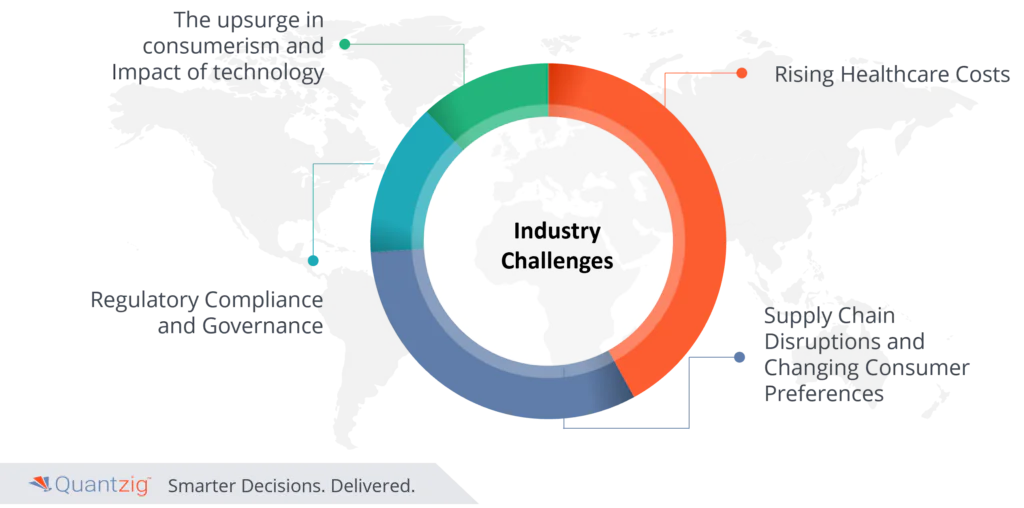In the intricate landscape of healthcare retail, pricing strategies wield immense influence over market dynamics, customer behavior, and competitive positioning. A recent pricing analytics engagement undertaken by a prominent healthcare retail client underscores the criticality of assessing price differentials to gauge their impact on overall market share. Through meticulous analysis and data-driven insights, this client embarked on a transformative journey to refine strategies, optimize customer engagement, and solidify its competitive stance in a rapidly evolving marketplace. This exploration sheds light on the pivotal role of this tool in retail in driving informed decision-making, fostering strategic alignment, and unlocking growth opportunities within the healthcare retail sector.
Table of Contents
What is the Pricing analytics?
It involves the systematic analysis of data to determine optimal price strategies for products or services. In the healthcare sector, this tool plays a crucial role in understanding various factors such as insurer-negotiated rates, competitive pricing dynamics within the healthcare marketplace, and the range of prices associated with specific procedures like CT/MRI scans and laparoscopic surgeries. It encompasses leveraging data intelligence and analytics capabilities to make informed business decisions regarding price structures, taking into account factors like insurance provider negotiations, unique value propositions, and consumer preferences.
The need for a dynamic data driven Pricing Strategy
A dynamic, data-driven pricing strategy is essential for healthcare organizations to remain competitive and maximize profitability. By harnessing data readiness and analytics capabilities, organizations can adapt their price strategies in real-time to changes in the market, regulatory requirements, and consumer behavior. This approach enables healthcare businesses to optimize pricing for various services such as mammography and MRI brain scans, ensuring that prices are both competitive and aligned with the value delivered to patients.
Moreover, dynamic pricing strategies allow healthcare organizations to enhance patient care by investing in state-of-the-art equipment and technology while remaining financially viable. They also enable organizations to effectively manage payer contracts and negotiations with insurance providers, ensuring that negotiated prices are reflective of market dynamics and organizational objectives.
In today’s competitive landscape, where consumer visibility and comparison shopping are prevalent, a data-driven approach to pricing is imperative for healthcare organizations to attract and retain paying customers. By leveraging this tool, organizations can enhance their marketing efforts, drive consumer engagement, and differentiate themselves in the market by offering compelling value propositions.
Ultimately, this solution facilitates data-driven decision-making, enabling healthcare organizations to optimize profitability, improve patient care, and remain competitive in the dynamic healthcare landscape.
What the Client Wanted
Optimize operational cost and maximize revenue with the help of pricing analytics.
The Outcome
Identified the crucial price points aspects and maximized sales and profits.
Summary of the Healthcare Retail Industry
A few things can be as potentially disruptive as retail healthcare or retail clinics in the global healthcare industry. By their very existence, retail healthcare could threaten or complement at essential parts of the healthcare structure, including hospitals and pharmaceutical equipment manufacturers. In addition to the expanding critical care offerings, firms in this industry are increasingly partnering with national pharmacies and retailers to establish walk-in healthcare retail outlets.
Experience the advantages firsthand by testing a customized complimentary pilot designed to address your specific requirements. Pilot studies are non-committal in nature.
Request a free pilot
Industry Challenges
- The upsurge in consumerism: The factors affecting the growth of organized healthcare retail include consumer demand, convenience, comfort, time, and location. Moreover, healthcare retail firms today face a more knowledgeable and demanding consumer base. The increase in consumer expectations has forced these firms to change the format of healthcare retail trade.
- Impact of technology: The introduction of electronic marketing techniques, media, and computerized billing systems have changed the face of healthcare retail firms when it comes to providing robust medical services to customers. As a result, it is pivotal for firms to embrace technological advancements to stay on par with the competition.
- Rising Healthcare Costs: One of the paramount challenges confronting healthcare retail is the escalating costs associated with medical services, medications, and treatments. As healthcare expenses continue to soar, consumers are becoming increasingly price-sensitive, scrutinizing costs, and seeking affordable alternatives. Healthcare retail firms must navigate this landscape by optimizing operational efficiencies, negotiating favorable supplier agreements, and implementing cost-effective pricing strategies without compromising service quality.
- Regulatory Compliance and Governance: The healthcare retail sector operates within a complex regulatory environment characterized by stringent compliance requirements, licensing mandates, and quality standards. Firms must continually monitor and adhere to evolving regulations, maintain rigorous governance frameworks, and invest in compliance management systems to mitigate risks, ensure patient safety, and avoid costly penalties or sanctions.
- Supply Chain Disruptions: Healthcare retail firms grapple with supply chain complexities, encompassing sourcing, inventory management, distribution, and logistics. Disruptions, including supplier shortages, logistical challenges, global pandemics, or geopolitical uncertainties, can severely impact product availability, service delivery, and customer satisfaction. To mitigate these risks, firms must cultivate resilient supply chains, diversify sourcing strategies, and leverage data healthcare analytic solutions to forecast demand, optimize inventory levels, and enhance supply chain agility.
- Changing Consumer Preferences: The evolving preferences and expectations of today’s consumers present a significant challenge for healthcare retail firms. Modern consumers demand personalized experiences, convenient access to services, digital engagement channels, and seamless omnichannel interactions. To meet these expectations, firms must innovate their service offerings, adopt customer-centric approaches, invest in digital transformation initiatives, and create integrated, omnichannel experiences that resonate with diverse consumer demographics.
- Competitive Landscape: The healthcare retail sector is experiencing intensified competition, characterized by the entry of new players, disruptive business models, and innovative service offerings. Established firms must differentiate their value propositions, innovate continuously, foster strategic partnerships, and cultivate brand loyalty to retain market share, attract new customers, and sustain competitive advantage amidst evolving industry dynamics.
- Talent Acquisition and Retention: The healthcare retail industry faces persistent challenges related to talent acquisition, development, and retention. Firms require skilled professionals, including healthcare practitioners, pharmacists, customer service representatives, and technology experts, to deliver high-quality services, drive innovation, and foster organizational growth. To address talent shortages, firms must invest in recruitment strategies, employee training programs, career development initiatives, and competitive compensation packages to attract, retain, and develop top talent in a competitive labor market.
Book a demo to experience the meaningful insights we derive from data through our analytical tools and platform capabilities. Schedule a demo today!
Book a demoCan pricing analytics help healthcare business to increase profit?
Pricing analytics wield substantial potential to bolster profitability within the healthcare sector. By leveraging insurer-negotiated rates and competitive pricing insights from the healthcare marketplace, healthcare businesses can optimize their business strategies. This involves analyzing a range of factors, including negotiated prices for procedures such as CT/MRI scans and laparoscopic surgeries, as well as understanding the price structures of insurance providers.
Data readiness and intelligence play pivotal roles in this process, empowering healthcare organizations to make informed business decisions. Tech companies specializing in analytics can provide advanced tools to extract actionable insights from vast datasets, enhancing analytics capabilities and aiding in the formulation of marketing efforts based on unique value propositions.
Through sophisticated data analysis, healthcare businesses can identify optimal pricing points that balance profitability with consumer visibility and value propositions. This involves considering factors like patient care, state-of-the-art equipment costs, and the range of prices within the market. Additionally, analytics can facilitate comparison shopping for paying customers, driving consumer engagement and loyalty.
Furthermore, this tool enables healthcare businesses to navigate regulatory landscapes, including compliance with CMS guidelines and privacy settings. Implementing robust data processing protocols ensures the accuracy and privacy of patient information while optimizing pricing strategies. By aligning pricing decisions with business objectives and market dynamics, healthcare organizations can enhance profitability and competitiveness in the Minneapolis-area hospitals and beyond.
About the Client
The client is a renowned healthcare retail player based out of Canada.
Client’s Challenge
The client, a leading player in the healthcare industry was facing predicaments in understanding the pricing structure of their competitors. As a result, they wanted to gain insights into the competitors’ pricing analytics in retail structure and compare their pricing structures to theirs. Additionally, the client wanted to leverage the use of price analytics solutions to boost the efficiency of their networks, segment target customers, and drive profitability.
Summary of our Engagement
Business Impact
With the help of Quantzig’s pricing analytics solution, the healthcare industry client gained real-time insights into the pricing analytics for healthcare and made proactive decisions. Furthermore, the client effectively identified price points and maximized sales and profits. The client further evaluated customer behavior and predicted customer churn and better-channelized marketing efforts to enhance their ROI.
Pricing Analytics Solution Insights
Quantzig’s pricing analytics solutions help firms in the healthcare industry to assess the impact of price differentials on the overall market share. Additionally, companies can estimate the impact of pricing on sales volume. With the help of healthcare analytic solutions, healthcare retail players can gain a clear and precise understanding of the customer base and their expectations on pricing.
How Quantzig can help your healthcare organization?
Quantzig, a leading analytics firm, offers comprehensive solutions to optimize pricing strategies and drive profitability for healthcare organizations. Leveraging advanced data intelligence and analytics capabilities, our team empowers healthcare businesses to navigate complex dynamics such as insurer-negotiated rates, competitive pricing in the healthcare marketplace, and the diverse range of procedures like CT/MRI scans and laparoscopic surgeries.
Our expertise extends to understanding the intricacies of insurance provider negotiations, ensuring that healthcare organizations can maximize revenue while maintaining competitive price structures. Through meticulous data processing and analysis, we enable businesses to make informed business decisions, aligning price strategies with unique value propositions and consumer preferences.
Furthermore, we provide actionable insights to enhance marketing efforts, improve consumer visibility, and drive engagement among paying customers. By leveraging analytics, healthcare organizations can optimize patient care, invest in state-of-the-art equipment, and navigate regulatory requirements from entities like CMS, including privacy settings and preferences.
Our solutions facilitate comparison shopping for consumers, driving transparency and trust while ensuring compliance with privacy regulations and cross-website tracking preferences. Overall, Quantzig’s tailored analytics solutions empower healthcare organizations in the Minneapolis area and beyond to unlock new opportunities, increase profitability, and make key business decisions with confidence.
Get started with your complimentary trial today and delve into our platform without any obligations. Explore our wide range of customized, consumption driven analytical solutions services built across the analytical maturity levels.
Start your free trial nowIn conclusion, the pricing analytics engagement enabled the healthcare retail client to navigate complexities, assess the ramifications of price differentials, and strategically enhance its market share. By leveraging data-driven insights, refining pricing strategies, and optimizing customer value propositions, the client fortified its competitive advantage, fostered customer loyalty, and capitalized on emerging market opportunities. This transformative initiative underscores the indispensable role of pricing analytics for healthcare in shaping competitive strategies, driving sustainable growth, and positioning healthcare retail organizations for success in an increasingly competitive and dynamic landscape.




